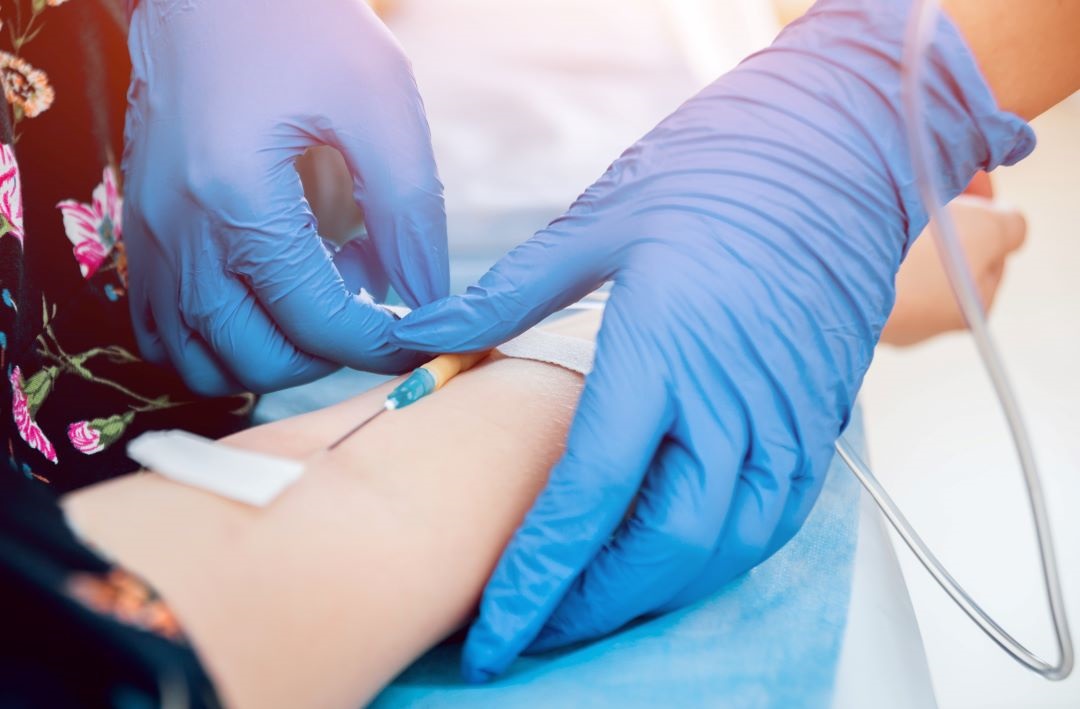Hydration IV



Hydration Therapy is a unique treatment that administers electrolyte-packed IV fluids directly into a patient’s bloodstream. Depending on the patient’s needs, the fluid may be enhanced with additives such as calcium, magnesium sulfate, or a Vitamin B complex.
The loss of essential body fluids and nutrients is possible due to many causes or physical neglect. Hence, the patient needs compensatory means that nourish the body and provide it with essential fluids, such as iv fluids, to treat dehydration.
At Tadawi Medical Center, you will find Hydration IV and treatment of dehydration under the medical supervision of the most experienced doctors based on the patient’s medical history, age, and the reasons that led to his dehydration.
What are IV fluids?
IV fluids are the insertion of fluids, nutrients or medicine solution (intravenous line) into a vein in your arm to pump a quantity of fluid that includes electrolytes and is made of sodium chloride and water to treat dehydration, hydrating the body and facilitate the delivery of vitamins and fluids into the bloodstream, thus speeding up the recovery time from illnesses that cause dehydration.
When should I take IV hydration?
Children and adults should use iv fluids in these cases:
- Fluid loss due to diarrhea or vomiting.
- Feeling tired, dizzy, lack of movement and activity.
- Dry skin, dry mouth, and eyes, and loss of skin elasticity.
- Not using the bathroom to urinate for 12 hours.
- Rapid heartbeat and rapid breathing rate.
What is hydration IV good for?
- Dehydration treatment
IV therapy provides the body with vitamins and nutrients such as zinc and vitamin C, strengthening the body’s immunity and improving health to replace body fluid loss, fever dehydration, and hyperemesis graviderem.
- Detoxing the body
Intravenous fluids treat digestive problems, such as liver or kidney damage, caused by the accumulation of toxins radicals in the body because it provides the fluids vitamins and antioxidants needed by each organ.
- Skincare-brightness
Intravenous fluids keep the skin soft and hydrated, relieve fatigue and tension, and regulate body temperature.
- Restore joint and muscle health
IV therapy relieves joint and muscle pain caused by lack of hydration due to the electrolytes contained in the hydration.
Is there a dehydration test?
Dehydration is diagnosed by paying attention to the symptoms or by one of the following methods:
- Urine examination
The urine test shows the causes of body dehydration, such as an increase in the concentration of glucose or protein in the urine or the presence of infections due to kidney disease or diabetes due to lack of drinking water.
- Blood test
The blood tests show the degree of body dehydration and its causes. Among the indicators resulting from dehydration are a high level of salts, urea, creatinine, and an increase in white blood cells.
What are the 3 main types of IV fluids?
- Normal Saline
A crystalline liquid (passes easily through the cell membrane), a nonpyrogenic solution, presents the same concentration of solute and is used to increase plasma volume, compensate for a fluid deficiency in the patient, blood transfusions, and compensate for sodium deficiency because it contains a high percentage of sodium and calcium. Therefore, it is used with caution in patients with heart and kidney diseases.
- Half of the normal saline
A hypotonic crystalline solution has a lower concentration of solutes than plasma (half the concentration of chloride) unlike normal saline, which is an isotonic solution, treats patients with renal dehydration and loss of gastric fluids, and is suitable for diabetics who cannot tolerate additional glucose, and is not given to patients Burns, liver disease or trauma.
- Ringer’s lactate solution
A neutral solution consisting of water and some salts such as sodium, potassium, calcium, chloride, and lactate. It does not contain glucose. It is used to compensate for fluid deficiency and neutralize the acidity of the blood for people who suffer from fluid retention. It is forbidden for people who suffer from kidney failure, heart failure, and liver cirrhosis.
How long does IV hydration last?
The patient may not be satisfied with one session to treat the dehydration of the body. He may need many sessions to replace the lost vitamins and fluids from the body, and the iv hydration therapy takes between 20 minutes to an hour, and this depends on the patient’s health condition.
The patient may need nutritional supplements and, drink a lot of fluids, follow a healthy plan to maintain body moisture.
What are the risks of IV hydration?
Despite the benefits of iv fluids for dehydration, it causes some harm if it is used without the supervision of a specialist, namely:
- Infection because it is injected through an intravenous cannula.
- Allergy to one of the types of vitamins, minerals, or foods.
- Kidney damage as a result of a disease or infection.
- High fever, rapid or decreased heart rate.
If you feel any strange symptoms, you must inform the doctor immediately.
When is dehydration dangerous?
Some people are more susceptible to dehydration, and their symptoms may be more severe and dangerous than others, and they are:
1. Babies
Children having severe diarrhea and vomiting expose them to loss of fluids and vitamins from the body, which exposes them to severe dehydration, which is a serious condition that causes physical harm to them, especially since they cannot tell you about their health condition or their feeling of dehydration.
2. Elderly people
Aging causes a decrease in fluid stores in the body, and the problem is exacerbated by chronic diseases such as diabetes and dementia or the use of certain medications, which affect the health of the elderly negatively.
3. People with chronic diseases
Most people are dehydrated, especially if drinking water or vitamins is neglected, including those with diabetes or kidney disease.
4. Sports practitioners
People who exercise need a sufficient amount of water daily. Dehydration affects them and raises body temperature, causing them to feel dizzy and very tired.
How do you feel after hydration IV?
The body’s activity returns immediately after the IV therapy of fluids that nourishes the body. The patient may feel discomfort around the injection site, and minor bruising may appear, but it disappears quickly.
BOOK NOW